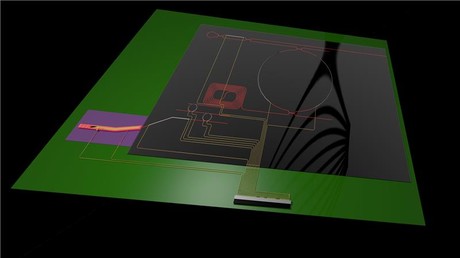Smallest narrowband laser on a chip developed

Researchers at the University of Twente in the Netherlands, working in collaboration with microsystem provider LioniX, have created what is claimed to be the world’s most narrowband diode laser on a chip. Their work represents a breakthrough in the fast-growing field of photonics — a key technology involving the deployment of photons (light particles) for transporting and processing data.
For photonic chips to function as efficiently as possible, one has to be able to properly control the light signals. This means that all the light particles being transmitted must have, as closely as possible, the same frequency — that is, the same colour.
The University of Twente researchers have now managed to develop a minuscule laser on a chip with a maximum bandwidth (the maximum uncertainty of frequency) of just 290 hertz, making it the most accurate laser on a chip that has ever been created. As explained by research leader Professor Klaus Boller, “Our signal is more than 10 times more coherent — or clean — than any other laser on a chip.”
The device is a hybrid laser, which means that it essentially consists of two different photonic chips, optically connected to each other. It is also tuneable, which means that users can choose the colour of the laser themselves, within a broad range.
The laser is expected to bring countless applications within reach, such as controlling movable antennas on phone masts for 5G mobile internet, faster data flows through glass fibre networks, more accurate GPSs and sensors for monitoring the structural integrity of buildings and bridges.
Organic transistor 'limitation' improves stability
Researchers have shown that a longstanding organic transistor design limitation actually improves...
OLED circular polarisation is now electrically switchable
Researchers have discovered a way to control left- or right-handed polarised light via charge...
Nanoscale pixels to advance augmented reality eyewear
Physicists have developed extremely small pixels that can be used in compact AR glasses, using...




